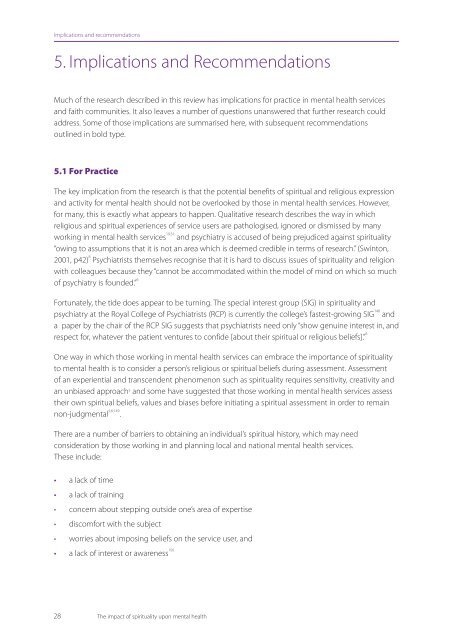The Gift of Spirituality
The Gift of Spirituality
The Gift of Spirituality
Create successful ePaper yourself
Turn your PDF publications into a flip-book with our unique Google optimized e-Paper software.
Limitations <strong>of</strong> the research<br />
4.2 Lack <strong>of</strong> distinction between religion and spirituality<br />
<strong>The</strong>re is recognition (at least theoretically) that there are differences between religion and spirituality<br />
and that either can be practised without the necessary involvement <strong>of</strong> the other. Operationally,<br />
however, the distinction between religious practices and spirituality is <strong>of</strong>ten blurred, with much <strong>of</strong><br />
the research using measures <strong>of</strong> religious practice as a proxy for spirituality 22 . Although this is possibly<br />
a reflection <strong>of</strong> pragmatic funding or measurement issues, it leads to an over-emphasis <strong>of</strong> Christian<br />
traditions in much <strong>of</strong> the literature. For example, one study that found lower levels <strong>of</strong> depression in<br />
participants with deeply held religious values 115 used exclusively Christian language in their survey.<br />
Others have argued that participants who rejected this language may have held equally spiritual values<br />
that may have gone unrecognised due to the terminology used in the operationalisation 21 .<br />
One challenge for researchers is to disaggregate the concepts <strong>of</strong> religion and spirituality and to more<br />
systematically analyse the effects <strong>of</strong> different expressions <strong>of</strong> spirituality on mental health 34 .<br />
4.3 Population biases<br />
Much <strong>of</strong> the research in the field focuses on the effects <strong>of</strong> spirituality on mental health problems and<br />
few studies address the mechanisms through which spirituality may promote good mental health<br />
and wellbeing in populations without those problems. As shown earlier, some aspects <strong>of</strong> spirituality<br />
have been demonstrated in relation to depression 1;17;116;117 , anxiety 52;57;118-121 , post-traumatic stress<br />
disorder 13;35;62;65;66;122 and schizophrenia 68;69;123 . Research has also examined the links between spirituality and<br />
other mental health problems, including addiction and substance abuse 124 , anti-social behaviour 125;126<br />
and personality disorders 127 .<br />
Despite the substantial amount <strong>of</strong> evidence linking spirituality with improved mental health in people<br />
with these problems, a literature search using the terms “religion” or “spirituality” with “mental wellbeing”<br />
yielded no results at all. It appears that the benefits <strong>of</strong> spiritual activity for those without mental health<br />
problems is an undervalued arena <strong>of</strong> research and an untapped source <strong>of</strong> potential for those wishing to<br />
improve their general mental health and wellbeing.<br />
Similarly, very rarely has spirituality been explored in populations who may not use spiritual<br />
terminology to describe themselves, or who may not regard themselves as spiritual at all. Research<br />
populations are either recruited from religious establishments or faith communities, which introduces<br />
an implicit bias into the data. Whilst it is easy to understand that research in self-pr<strong>of</strong>essed “non-spiritual”<br />
or non-religious individuals may be more complex than with those who pr<strong>of</strong>ess to hold religious<br />
beliefs, research should attempt to discover those aspects <strong>of</strong> life that give meaning to individuals that<br />
are beyond the traditional parameters <strong>of</strong> religion.<br />
26<br />
<strong>The</strong> impact <strong>of</strong> spirituality upon mental health

















